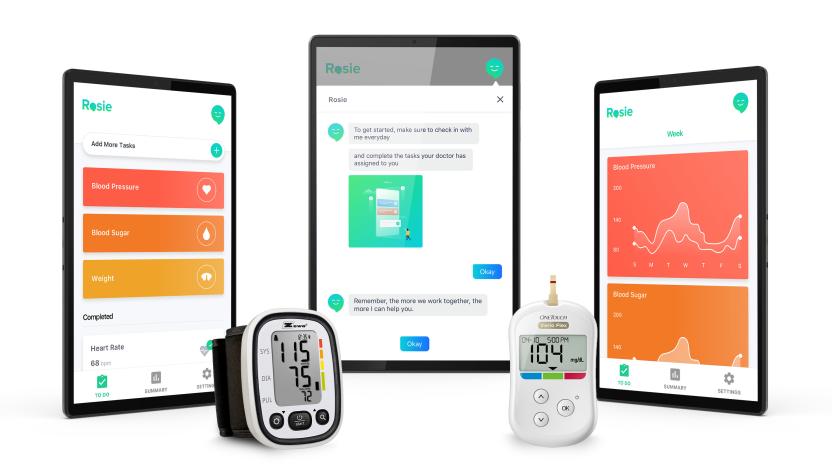patients
Latest

Lenovo's Virtual Care service helps chronically ill patients track their health
Lenovo has jumped into digital healthcare with a service called Virtual Care designed to help chronically ill patients better track their health.

The NHS wants to give wearables to hospital patients
To cut costs and improve patient care, the NHS is looking to technology more than ever before. Under its latest proposals, Britain's healthcare service wants to introduce free wi-fi across all of its hospitals, giving doctors and nurses the ability to use tablets on the wards. The hope is that this will reduce paper waste and speed up administrative tasks, giving staff some extra time to visit their patients. It also opens up the possibility for patients to wear wearables, such as skin sensors. Patients with diabetes, for instance, could then be monitored around the clock to help doctors spot early signs of deterioration.

Steve Jobs has been awarded almost 150 new patents since his death
Steve Jobs died on October 5, 2011, in Palo Alto, CA, leaving behind a legacy of technological innovation and having built one of the largest companies in the world. At the time of his death Jobs had been awarded 317 patents over the course of his life, an incredible portfolio for anyone. But something interesting as happened since then; Job's number of patients now stands at 458. In the years since his death Steve Jobs has been awarded 141 additional patents. The patient news was discovered and documented by the MIT Technology Review, who point out that the distinction for posthumous patent awarding might now be exactly what it may seem. While Jobs was indeed an innovator, often the placement of his name on a patent had to do with his work on smaller details of a design, fine tuning things others might not think about. Tim Wasko, who developed the interface for Apple's QuickTime player and the iPod, remembers that Jobs would give feedback on small details, and he'd often end up with a position on a patent. That's what Wasko says happened when he came up with a concept for a button used on software called iDVD. The button shuts like an iris, giving you a chance to interrupt a process. "It looked pretty cool so he loved that," says Wasko. "He had useful comments, suggestions, and it's worthy of him being on the patent." If you're interested in how patents work MIT Technology Review's article goes into some of the specifics of why patents like this are awarded, even after someone's death. In the meantime we're looking forward to seeing how many patents Steve Jobs will be able to collect this year while his soul is off watching from above.

Sony unveils first medical-grade OLED monitor, surgery gets rendered in all-too-vivid color
OLED screens are virtually everywhere, and they're steadily getting bigger, but it was tough to find any in hospitals until now. While Sony's 25-inch PVM-2551MD might not have the most glamorous name, it's the first and only OLED monitor with FDA approval for use in surgery. No, it's not just to give the doctor something more pleasing (or disgusting) to look at while she's removing a gallstone -- the organic display can be a genuine help for surgery through the higher contrast, virtually non-existent blur and more faithful color reproduction versus the LCDs it's meant to replace. Us patients likely won't see the now-shipping 2551MD for much longer than it takes to go unconscious, so it might be hard to appreciate; if it helps surgeons finish operations faster and with fewer mistakes, however, we could all reap the rewards.

NYU medical center goes sci-fi, scans patients' palms
NYU's Langone Medical Center is getting a jump on that whole 21st-century medical care thing by ditching the clipboards and paperwork for palm scans and digital databases. On June 5th the hospital threw the switch on an electronic patient-tracking program from Epic Systems and paired it with biometric identification technology from PatientSecure, which scans the veins in persons hands using near-infrared light. Instead of being forced to fill out forms with your insurance info and social security number every time you visit, you simply place your hand on a scanner and -- ta-da! -- your records come right up. By combining the vasculature scans (which are even more unique than fingerprints) with patient photos, NYU should be able to minimize misidentification and cut down on duplicate records. Rather than go out on some cheesy pun about palm reading, we'll leave the predictable word play to the folks at ABC news -- check out their coverage after the break alongside PR from the Langone Medical Center.

Japanese doctors recommend Brain Training for seniors
Nintendo's line of brain-training games for the DS has found success among a wide range of ages in Japan, but its success with seniors has now been noted even among doctors and hospitals over there.According to the Associated Press, some hospitals have started placing DSes in waiting rooms and wards for patients. An administrator of a "memory loss clinic" in a Kyoto hospital said that doctors there have gone so far as to recommend the purchase of a DS and a game for elderly people to "stimulate their brains regularly at home," even watching patients play as an informal method of diagnosing dementia.Apparently, "Sony rushed out its own version of brain-training software in October but has yet to release sales figures." It's unlikely that the title could match the millions of units sold by its DS-based rival, but regardless of who's ahead, the gaming community should be pleased that 67-year-olds are now eager to "play a little everyday before going to bed," maybe even beating their grown-up children at the game someday.[Thanks, madgamer & samsoon; via Go Nintendo & GameDaily BIZ]




